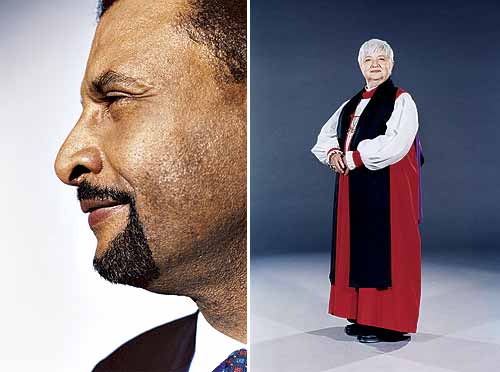
Rev. Timothy Keller
Redeemer Presbyterian
Keller has become the most successful Christian Evangelist in the city by recognizing what marketers have known for decades: that young professionals and artists are “disproportionately influential” in creating the country’s culture and that you have to meet this coveted demographic on its own terms. With intellectual, brimstone-free sermons that manage to cite Woody Allen alongside Matthew, Mark, Luke, and John, Keller draws some 5,000 young followers every Sunday. Church leaders see him as a model of how to evangelize urban centers across the country, and Keller has helped “plant” 50 gospel-based Christian churches around New York plus another 50 from San Francisco to London.
Rev. A. R. Bernard
Christian Cultural Center
New York’s megachurch man. His Christian Cultural Center—built on an eleven-acre campus in Canarsie, it would look more at home in Houston or L.A.—now has a congregation of more than 25,000 (with another 300,000 tuning in to hear Bernard on WMCA-AM). Vocal converts like Jason Kidd and Star Jones have helped spread Bernard’s version of the prosperity gospel: taking personal responsibility, living by biblical standards, and finding success in all parts of life. And Bernard has leveraged his ministry into considerable power—politicians like Spitzer and Bloomberg have courted him avidly, as has developer Bruce Ratner. Disney flew Bernard to Burbank to show him an early rough-cut of Narnia, then held a marketing event at the CCC for 700 New York religious leaders.
Charles Bronfman
Jewish philanthropist
The largesse of Bronfman—and his late wife, Andrea—is reshaping the way that thousands of young, urban, secular-leaning Jews connect with their faith. Every year, Bronfman awards $15 million to $20 million—and leverages another $200 million from other foundations—to innovative, media-savvy, youth-focused Jewish programs. Birthright Israel is sending its 100,000th Jew to Israel this summer, and the arts nonprofit Reboot puts out 20,000 copies of the bi-monthly Guilt and Pleasure magazine and sponsors informal salons from Park Slope to Morningside Heights.
Robert Thurman
Co-founder, Tibet House U.S.
Aside from the Dalai Lama himself, no one has done more to spread international awareness and appreciation for Tibetan Buddhism than Thurman, a former monk and current Columbia professor. His translations made key texts available to English speakers, and his charismatic speaking tours have inspired thousands around the country. Yes, he’s Uma’s father, and remarkably Hollywood-savvy—in 1987, he and Richard Gere founded Tibet House, a nonprofit organization favored by celebrities that hosts events ranging from yoga retreats to mind transformation.
Cardinal Edward Egan
Roman Catholic Archdiocese of New York
In addition to his pastoral responsibilities—no one holds more sway over the daily lives of New York’s 2.5 million Catholics—Egan is the Catholic Church’s version of a corporate-reorganization specialist, eschewing the bully pulpit to focus on putting the diocese on stable financial footing. Witness this spring’s spate of school closings: With a single swing of the axe, he cut 31 parishes and a dozen schools. And insiders say there are deeper cuts to come.
Imam Shamsi Ali
96th Street Mosque
Ali is the one imam who can mediate between the diverse and fractious elements of the 800,000-member Muslim community in New York. A moderate and a revered scholar of the Koran, he leads 1,000 Muslims in worship at the Indonesian Cultural Center in Woodside, 4,000 Bengalis at the Jamaican Muslim Center, and lectures to crowds of 6,000 at the 96th Street Mosque, the city’s largest. Since 9/11, he has become the community’s unofficial emissary to law enforcement and the mayor’s office.
Bishop Catherine Roskam
Episcopal Diocese of New York
The most prominent female religious leader in the city, Roskam has been at the forefront of the movement to reconcile traditional religious beliefs with progressive politics for decades. Ten years ago, she started the street eucharist at the Gay Pride Parade; now, thanks in part to her advocacy, the first openly gay Episcopal bishop has been consecrated. When she became a bishop in 1996, she was the first woman to hold the position in the city (only the fourth in the country); today, 25 to 30 percent of priests in the diocese are women, and Roskam is battling to bring gender parity to the global Anglican Congress, having paved the way in her own backyard. Next: The Influentials in Ideas